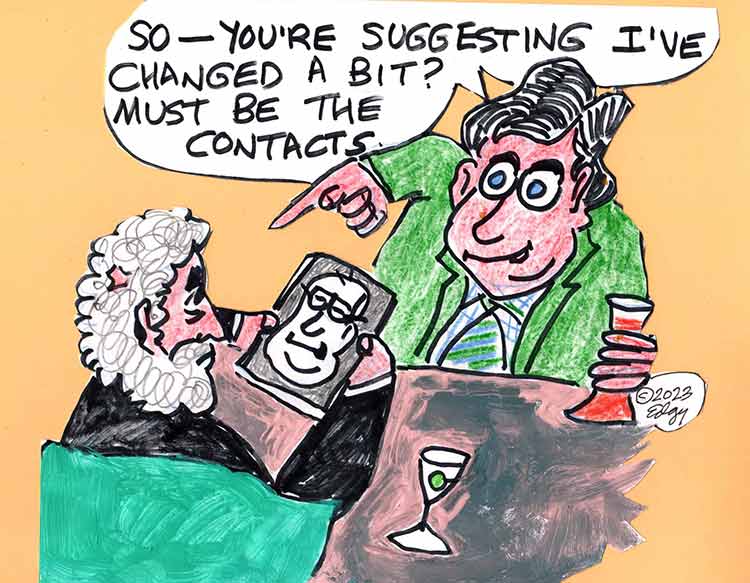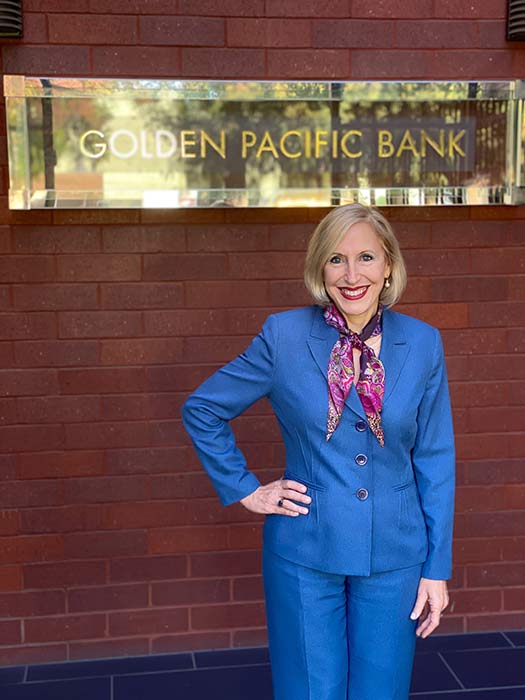WILL FEELING YOUNG MAKE YOU YOUNG? GROW UP!
Recent studies indicate there are some recent studies
By Ed Goldman
Feeling older than your chronological age is associated with a higher likelihood of dementia, frailty, stroke and heart diseases, according to recent research by scientists and academics studying links between psychology and health,” the Wall Street Journal reports.
If this is true, I’d have contracted Alzheimer’s disease at birth, since my mom once said, presumably as a compliment to my seeming maturity as a toddler, “You were born 35 years old.” Had I chosen to believe her I’d have thought I was 50 when I entered kindergarten. And arrived at my high school prom by ambulance. Or hearse.
Hair today and…
But my mom was largely correct. When I was a kid I often longed to be older—out of school, with my own car and apartment, a daily newspaper column and, if it helped complete the picture, even mild sciatica symptoms.
The WSJ article’s thesis, of course, was that feeling younger might make you healthier. Or, as it states in the opening paragraph, “Is it true that you’re only as old as you feel?”
Ironically, the week this story appeared, there was a fairly heated argument among some Facebook Friends in response to an ad that appeared on behalf of Just For Men, which has a line of hair dyes. Every comment was a variation of “I like my gray hair!” and “I earned every one of these gray hairs!” These came from guys, needless to add.
It took me by surprise because in my decades of interviewing people I started noticing a shift in how men and women handled the more visible vicissitudes of aging.
Most women have always worn makeup and/or dyed their hair, which I understood as partial vanity, partial recreation. Many little girls love to play “dress-up.” How sweet to still be doing it when your daily cares have evolved from making mudpies to making a living.
Then, at a lunch interview about 30 years ago it struck me that the man I was talking to had not only dyed his hair, eyebrows and mustache to an almost reflective shade of onyx, but also sported a light blue line of shadow above his already aqua eyes. He probably looked great in photos—just as heavily made-up actors and models can—but across a table at a busy restaurant he looked like a caricature of himself or a wannabe guest on “RuPaul’s Drag Race.” (Candor dictates my sharing that RuPaul’s show actually began airing in 2009, making the foregoing an anachronistic gag. I plan to travel back in time to correct it or issue a formal apology.)
The icing on the cake was when the tinted fellow asked me to not reveal his age in the column for which I was interviewing him. He was only about five years older than I was (he probably still is); I was in my early 40s (I no longer am).
It was the first time a guy had made that request. Until then, some of the women I interviewed had asked me not to write how old they were. But it was (and in most cases, remains) a common reporting practice to include a subject’s age. It’s usually a valid piece of datum since it helps the reader get a fuller picture of the interviewee’s accumulated wisdom or lack thereof.
Yet at about this same time, women stopped making the ask, sometimes even insisting that I include their ages in my articles. They were proud of what they’d achieved in their lives and I think correctly surmised that their authenticity could prove downright inspirational for the next generations of women.
These days, I’ve noticed that more than a few men I interview dye their hair. For some reason, they’ve been convinced that going a light shade of vermilion is preferable to letting nature provide them with a salt-and-pepper look (which is my own look, by the way—though the salt started dominating the pepper a few years ago).
What’s still difficult for me is when I sit down to chat with a man I might have vaguely known some years back when he was already actively engaged in balding and to discover he now has a thick thatch of fur starting a few inches above his eyebrows and concluding somewhere over the back of his collar.
I’m not talking about a partial hairpiece to cover what had been a nude crown; rather, I’m referencing a newly discovered, better-dressed relative of the Yeti.
Why would a guy who lost his hair because of simple genetics or evolution opt for a wall-to-wall carpet (add a few thousand dollars if you want a JFK-like nagging forelock)? Why would he subject himself to snarky remarks like, “You should remove the label with dry-cleaning instructions” or “Are chin straps extra or included?”
These are the things I’m pondering on the first day of March as I look forward to Spring and aging a little more gracefully than I have. Or than I feel I have. Whatever.
Ed Goldman's column appears almost every Monday, Wednesday and Friday. A former daily columnist for the Sacramento Business Journal, as well as monthly columnist for Sacramento Magazine and Comstock’s Business Magazine, he’s the author of five books, two plays and one musical (so far).
Yes, Virginia
A Weekly Blog by Virginia Varela
President, Golden Pacific Bank, a Division of SoFi Bank, Inc.
photo by Phoebe Verkouw
HOWDY, PARTNER(S)! LET’S INNOVATE
Last week I attended a forum sponsored by Cross River Bank and Upgrade to discuss “Responsible Bank Partnerships and Ways to Propel Innovation Forward.”
The discussion included an all-star panel presentation, moderated by Marty Mitchell, the Managing Partner of Forvis. Panelists included:
- Phil Goldfeder, SVP, Public Affairs, Cross River;
- Senator Monique Limón, Chair, Senate Banking and Financial Institutions;
- Assemblyman Tim Grayson, Chair, Assembly Banks and Finance;
- Tom Curran, Chief Risk and Compliance Officer, Upgrade; and
- Avy Mallik, General Counsel, DFPI.
Several leading bank and fintech experts were also in attendance.
The topic is timely and interesting, especially today in our fast-paced world. Many fintechs and depository institutions, such as banks and credit unions, have entered into partnerships with a common goal of providing a more diverse and broad range of financial services.
Some argue that there’s a trade-off between (1) efficiencies and digitalized services, and (2) consumer protections. However, the overall consensus at this meeting was that the two are not mutually exclusive. In fact, innovation—practiced in a responsible manner—can provide exponential benefits for consumers, and especially for the under-banked and under-served who may not have access to traditional bank branches.
I’ve personally witnessed the positive benefits of SoFi becoming a federal bank charter and help extend new pathways for our growing consumer base of more than 7 million members.
And, as a long-time banker, I contend that if financial institutions do not innovate—responsibly, of course—our industry is doomed to failure. Put another way, the future always begins right this minute.
sponsored content














